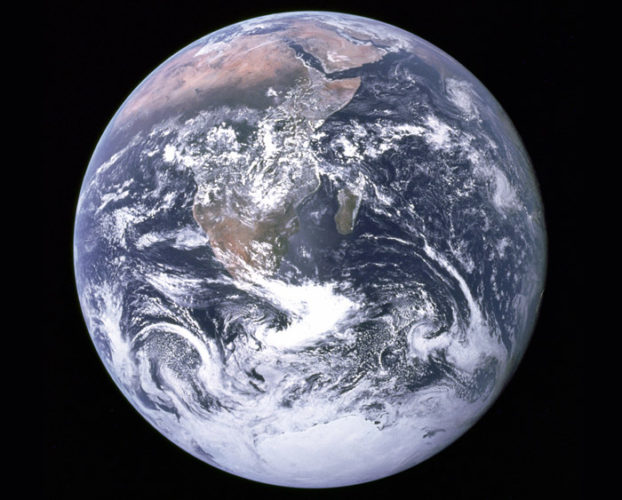Sandra Gibson examines environmental grief and how it affects us of us, albeit in different ways.
On 7th December 1972, Apollo 17 astronaut Harrison Schmidt stole a moment from the tight schedule to take a photograph of a beautiful blue sphere: planet Earth, his home. Released during a surge of environmental activism in the 70s, it became a symbol of Earth’s vulnerability in the vastness of space and one of the most reproduced images in history.
We don’t have to travel 18,000 miles from Earth’s surface to feel emotional and in awe. Centuries of art, writing, photography and recently, film, are sufficient testimony to her sublime, bountiful, diversity. More fundamentally, as Arthur C. Clarke said, “Either we are alone in the universe or we are not. Both are equally terrifying”. If we are alone, then home takes on a huge psychological significance vis a vis that vastness; if we are not alone then home becomes our refuge, to be defended. Drawn to the embrace of earth, sculptor Antony Gormley wrote: “It is something like sex, an urge to return to the place you came from, but also to the sheer power of those places – dark, silent, damp with millions of tons of earth all round – really like being inside the womb of the great mother and being in danger of dying there”1.
How, then, is the acknowledgement of unique preciousness and elemental yearning to be reconciled with our systematic trashing of the Earth? Since the Renaissance, individualism has increased, culminating in the self-absorption of the selfie generation; parallel with this, we have chosen capitalism as our economic model. Robyn Woolston2 won the 2012 Liverpool Art Prize with a potent metaphor for our times. She installed a dead silver birch tree, its roots stifled by a mulch of plastic cutlery, within a dim red-brick room at Edge Hill station – part of a system crucial to the proliferation of the industrial revolution. The ‘disposable’ cutlery simultaneously encapsulated consumption and waste: our undoing. Faced with spoilt beauty and a lost future, it is no wonder we are suffering from a trauma defined as ecological grief: “felt in relation to experienced or anticipated ecological losses, including the loss of species, ecosystems and meaningful landscapes due to acute or chronic environmental change”3.
Although under-researched4, apparently ecological grief affects us all, even people in professions one associates with detached study. Imagine the distress of marine biologist Steve Simpson5, for whom coral reefs are “rainforests of the sea”, finding that a bleaching event had turned the Great Barrier Reef into a “graveyard”. He considered abandoning his work.
Ashlee Consolo6 discovered that she shared the mourning of the indigenous Innuit communities whose itinerant hunting culture is threatened by increased temperatures. Here is her empathetic description of their plight: “This is a slow and cumulative grief, without end – unlike a human death, say. There’s not one moment that you can pinpoint, but long, enduring grief and anxiety that’s underneath”.
Deanna Witman7 worked originally within the structure of mainstream business, as a consultant studying the impact of infrastructure projects on the environment. When her creativity dried up, she realised she felt guilt as well as grief because she had been part of the system causing it.
Philosopher Timothy Morton8, who maintains that the end is not impending but already happening, has spoken of the incapacitating doom and the guilt that “eco-shock pieces” leave him in. On the other hand, equally incapacitated are those burying their heads in the sand of routine, or using dubious logic: if this is happening why isn’t everyone panicking? (They are – it just manifests in different ways like hedonism, self-abuse, and suicide.) Others, especially those protecting an economy based on fossil fuels, are in defiant denial, either rejecting science, or going into “technocratic saviour mode” whereby human genius will carbon capture the way out of it, without having to change the systems fundamentally. Or they simply believe that when the levee breaks, they, personally, will be safe in their air conditioned house on the hill.9
Clearly this tension between acceptance and denial, fear and defiance cannot be sustained. Our tragedy as a species is that we are destroying our precious home, pursuing, “Fairy tales of eternal economic growth”10 and have placed our faith in a technology that can’t keep pace.
The only thing we’ve got right is our grieving.
Read Sandra Gibson’s follow up piece Ditching the Patriarchal Paradigm?
References
- Antony Gormley: Drawing, Anna Moszynska, British Museum Press 2002
- www.robynwoolston.com
- Recent Nature Climate Change article
- Jessica Peverell FB XR Rebel Reports and discussions
- Steve Simpson is Professor of Marine Biology, University of Exeter UK
- Ashlee Consolo is Director of the Labrador Institute of Memorial University, Canada
- Deanna Witman is Assistant Professor of Environmental Humanities, Unity College, Maine
- Philosopher Timothy Morton: The End of the World Has Already Happened BBC radio 4
- Nik Cohn: Reimagining the City: New Orleans BBC radio 4
- Greta Thunberg
